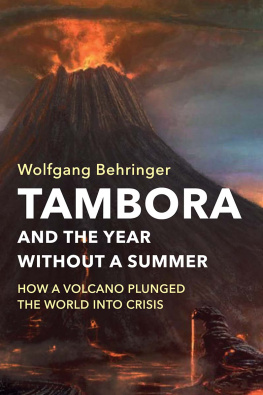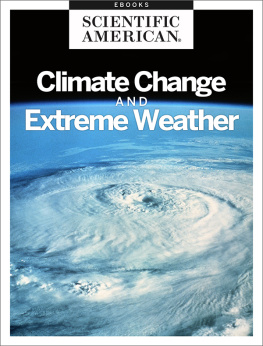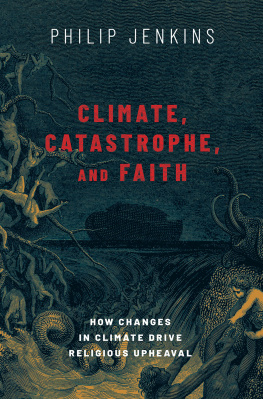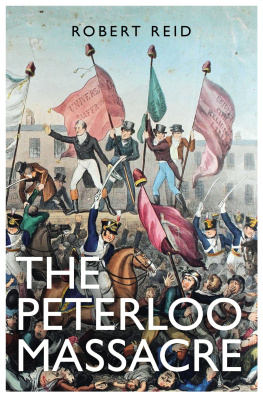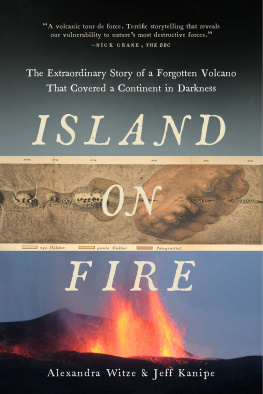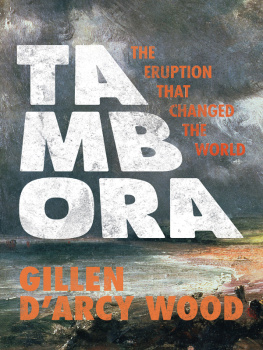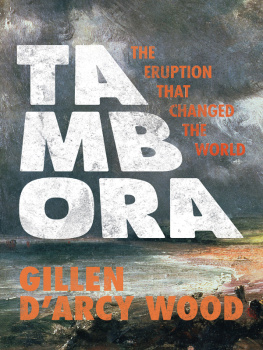
Tambora and the Year without a Summer
How a Volcano Plunged the World into Crisis
Wolfgang Behringer
Translated by Pamela Selwyn
polity
First published in German as Tambora und das Jahr ohne Sommer Verlag C.H. Beck oHG, Munich, 2016
This English edition Polity Press, 2019
The translation of this work was funded by Geisteswissenschaften International Translation Funding for Humanities and Social Sciences from Germany, a joint initiative of the Fritz Thyssen Foundation, the German Federal Foreign Office, the collecting society VG WORT and the Brsenverein des Deutschen Buchhandels (German Publishers & Booksellers Association).
Polity Press
65 Bridge Street
Cambridge CB2 1UR, UK
Polity Press
101 Station Landing
Suite 300
Medford, MA 02155, USA
All rights reserved. Except for the quotation of short passages for the purpose of criticism and review, no part of this publication may be reproduced, stored in a retrieval system or transmitted, in any form or by any means, electronic, mechanical, photocopying, recording or otherwise, without the prior permission of the publisher.
ISBN-13: 978-1-5095-2552-2
A catalogue record for this book is available from the British Library.
Library of Congress Cataloging-in-Publication Data
Names: Behringer, Wolfgang, author.
Title: Tambora and the year without a summer : how a volcano plunged the world into crisis / Wolfgang Behringer.
Other titles: Tambora und das Jahr ohne Sommer. English
Description: English edition. | Medford, MA : Polity Press, [2019] | Originally published in German as: Tambora und das Jahr ohne Sommer : wie ein Vulkan die Welt in die Krise sturzte. Based on 3rd German edition (Munchen : C.H. Beck, 2016). | Includes bibliographical references and index.
Identifiers: LCCN 2018038779 (print) | LCCN 2018040297 (ebook) | ISBN 9781509525522 (Epub) | ISBN 9781509525492 (hardback)
Subjects: LCSH: Tambora, Mount (Indonesia)--Eruption, 1815. | Volcanic eruptions--Social aspects--History--19th century. | Weather--Effect of vocanic eruptions on--Case studies. | Climatic changes--History. | World politics--Environmental aspects.
Classification: LCC QE523.T285 (ebook) | LCC QE523.T285 B4413 2019 (print) | DDC 363.34/95--dc23
LC record available at https://lccn.loc.gov/2018038779
The publisher has used its best endeavours to ensure that the URLs for external websites referred to in this book are correct and active at the time of going to press. However, the publisher has no responsibility for the websites and can make no guarantee that a site will remain live or that the content is or will remain appropriate.
Every effort has been made to trace all copyright holders, but if any have been overlooked the publisher will be pleased to include any necessary credits in any subsequent reprint or edition.
For further information on Polity, visit our website: politybooks.com
Dedication
For my mother, Margit Behringer (19252015), who taught me the joy of exploring new things.
I would like to thank Dr Justus Nipperdey, Johanna Blume, Judit Ruff, Sebastian Wei, Pascal Steinmetz, Johanna Ungemach and Areti Karanikouli for their assistance during corrections to the German edition.
INTRODUCTION: THE TAMBORA CRISIS
Would anyone be interested in reading a book about a volcanic eruption? In the case of Tambora, there is good reason to believe they would. This book is less about geology than about the societal reactions to an event that affected the climate worldwide the largest volcanic eruption in human history. The explosions of April 1815 were so powerful that they could be heard thousands of kilometres away. The lava and pyroclastic flow devastated the immediate surroundings, and cyclones, tsunamis, ash fall and acid rain the adjacent region. The explosion cloud reached a height of 45 km. Large parts of Asia suffered for months under a dry fog that obscured the sun. Upper winds distributed the gas and suspended particles around the world. The aerosols reduced solar radiation and led to a global cooling. The winter of 1815/16 was one of the coldest of the millennium. Glaciers expanded. Torrential rains caused flooding in China and India. In Europe and North America, 1816 became the year without a summer.
The years that followed were devoted to coping with the results of the crisis. Epidemics paralysed entire regions; mass migration shifted social problems to other corners of the globe; and mass demonstrations, uprisings and suicide attacks generated a pre-revolutionary mood. The eruption of Tambora served as a great experiment in fields where we normally cannot conduct experiments: the economy, culture and politics. The question is, how do different countries, legal systems and religions respond to a sudden worsening of living conditions imposed by external forces? To changes in nature, failed harvests, inflation, famine, epidemics and social unrest? As the Indian historian Dipesh Chakrabarty has noted, climatic events are uniquely suited to being viewed from a global perspective.
Throughout the world, the volcanic eruption forced the affected societies to confront a current problem using their own specific mechanisms for coping with an unexpected change in the climate that whether through cold, drought or constant rain challenged their usual means of supplying the population with basic necessities. Nearly all societies in the world had to demonstrate virtually simultaneously how capable they were of managing such a subsistence crisis, which almost always coincided with a spiritual crisis. Some of them seemed to do so effortlessly.
That is the topic of the present volume, which is interested not in the volcanic eruption as such, but in its cultural consequences as well as the capacities of societies at the time to respond to sudden climate change. The time period of this study is 1815 to 1820, dates that are familiar from political history as well. In 1815, participants in the Congress of Vienna resolved to reorganise the world, and in 1820, the Final Act of the Viennese Ministerial Conference integrated the intervening experiences of crisis into a set of regulations. The future US Secretary of State Henry Kissinger (b. 1923) wrote his doctoral thesis about this period, in which an excess of wars and crises led, through diplomatic negotiations, to a political order that assured peace and stability for a generation. The struggle for political stability took place in domestic politics as well, without some knowledge of which one cannot truly understand the foreign policy of the time. The domestic policy of these years was coloured by the climate crisis.
The period from 1815 to 1820 will be treated here as a coherent period of crisis I call it the Tambora Crisis, to define it by its triggering factor. When the literature refers repeatedly to a crisis in the wake of the European wars, does not apply here. Emile Durkheims social facts are abrogated when the conditions are set not by Napoleon or the bourgeoisie but by a volcano.
From the standpoint of global history, it is easy to see that the traditional explanations do not work everywhere anyway. Why should there be famines in China and South Africa or a cholera outbreak in India because Napoleon lost a war, the British Army demobilised its troops or more machines were used in European industry? Even in Europe, one would be hard-pressed to find documents showing that anyone connected the constant rain, floods and failed harvests or the unrest that followed with the wars and their end, or with nascent industrialisation. Historians who nonetheless make this claim have used the simple facts of chronology to draw a causal connection, along the lines of the post hoc fallacy, which psychologists call a logical fallacy.
Next page
